The top 10% are the dog sipping a drink as the cafe burns down, saying "this is fine."
What's the one thing we need to fix or nothing else matters?
There are plenty of potential candidates: immigration, healthcare, wokeism, hot war in Europe, inflation, draining The Swamp, etc.
Human history offers a definitive answer, and it's none of these issues. The answer is wealth inequality.
Historian Peter Turchin has focused on the tedious task of assembling data (as opposed to opinions, ideological positions and theories) on the crises and collapses of previous nations and empires. The keystone dynamic is soaring wealth inequality, which is shorthand for
power inequality
, as wealth generates power,
income inequality
, as wealth generates income, and
health inequality
, as wealth buys the best healthcare.
Turchin has written a number of books on the topic of social discord and collapse, but his recent article succinctly summarizes his findings: The deep historical forces that explain Trump's win:
"We're in a good position to identify just those impersonal social forces that foment unrest and fragmentation, and we've found three common factors: popular immiseration, elite overproduction and state breakdown."
All three are the consequences of exploding wealth inequality.
As wealth--which can be understood as
claims on future time, energy and productive assets
--is concentrated in fewer hands, the prosperity of the bottom 90% decays as costs rise and wages stagnate (i.e. immiseration), the economy no longer produces enough highly paid slots for the ever-increasing production of highly educated, high-expectations professionals, and since extreme concentrations of wealth corrupt the state, the state breaks down as
bread and circuses
no longer mask the gap between the top 1% (what Turchin calls "the proverbial 1%") and the top 10%, "a highly educated or 'credentialed' class of professionals."
The top 1% and top 10% set the contexts, narratives and agendas of the economy and society, and they're naturally coy about their role in soaring inequality.
In their view, the extraordinary rise in their personal wealth is the result not of asset bubbles generated by policies adopted to serve the influential, but of their "hard work" and remarkably excellent decisions--in other words, their soaring private wealth is
the natural order of things
, and those left behind are, well, the losers in a Darwinian competition which they won and continue winning.
This self-congratulatory hubris cloaks the reality few admit to, which is their wealth is largely the result of policies that inflated bubbles in assets which they happened to own or buy early in the bubble.
The top 10% fear a real rebalancing will transfer some of their wealth to the bottom 90%, and so they cling with fanatic tenacity to the fantasy that increasing their wealth will "trickle down" to the
little people
.
In their view, the correct policy decisions are those that will increase their wealth and income: cut taxes (which fall mostly on the top 10%), run trade and federal budget deficits that keep asset bubbles inflated, reward corporate monopolies and cartels, and promote the fantasy that "draining The Swamp" will somehow magically increase the wages of those who have lost ground for the past 45 years.
This chart of trade balances (i.e. trade deficits), wages as a share of U.S. GDP and the
S&P 500
stock market index (SPX) is instructive.
Note the diminutive size of the enormous asset bubbles of 1996-2000 and 2004-2008 compared to the stupendous
Everything Asset Bubble
which has so richly rewarded the owners of assets...
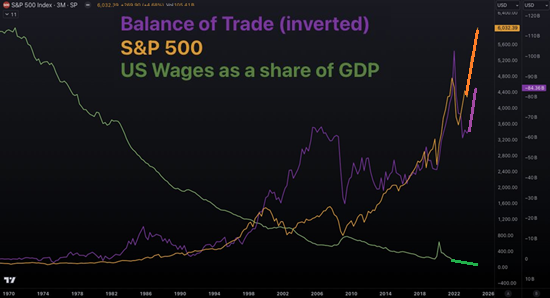
... who just happen to be the top 10%
, who own almost 90% of all stocks:
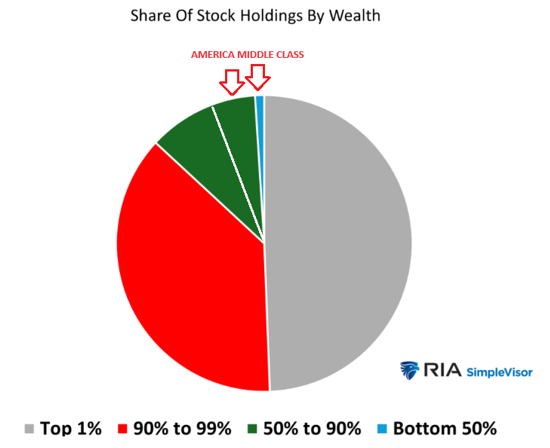
And stockholders have done very, very well as corporate profits have skyrocketed in multiples of inflation:
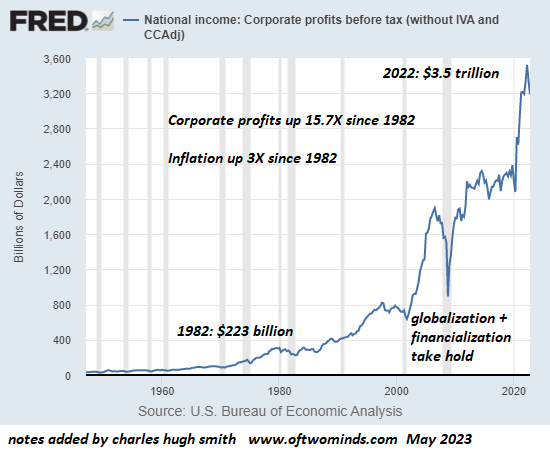
The top 10% are also coy about how the bottom 50% of U.S. households--65 million households, 170 million Americans--fared as the
Everything Asset Bubble
"raised all boats:"
well, not quite all boats, as the bottom 50%'s share of assets fell sharply (down 25%) as the wealth was concentrated in America's ruling / professional class.
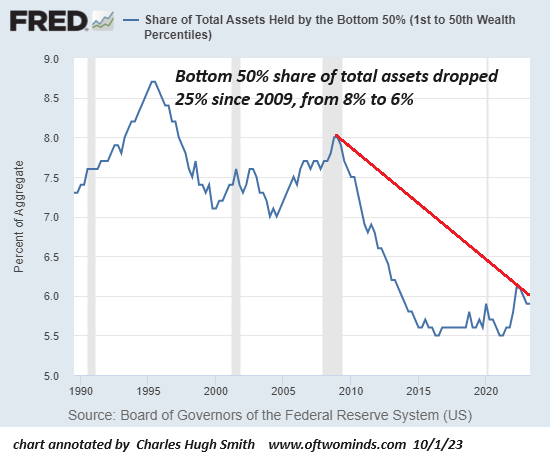
The top 10% are equally coy about the immense divide between the stagnating prospects of the bottom 50%
and the unprecedented wealth pouring into the vaults of the top 1% as their share of total assets rose 26%:
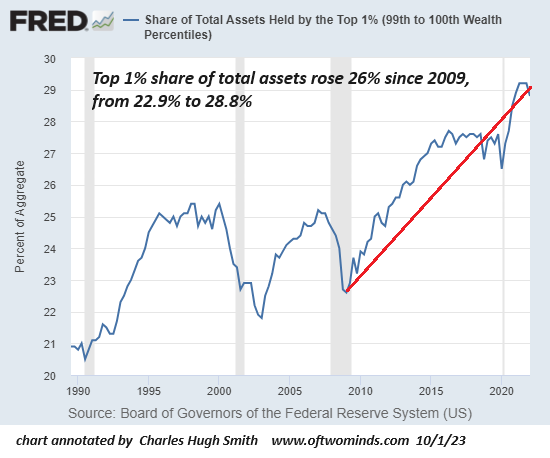
The net worth of the top 0.1% (330,000 Americans) exploded from $4 trillion in 2000 to $20.8 trillion today
, more than 5 times the net worth of the bottom 50% of Americans (170 million people).
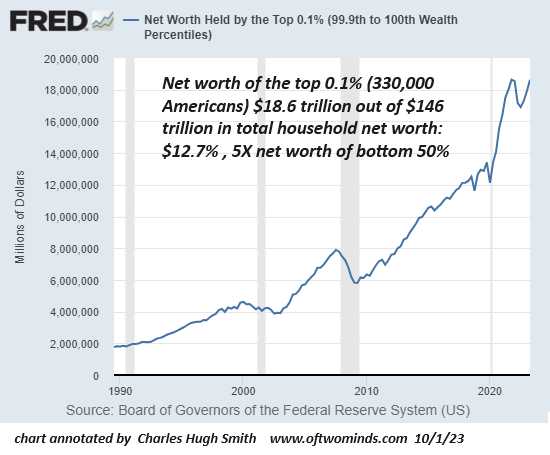
From low-Earth orbit, these
obscured by the self-serving
realities become visible:
1. The top 10%, regardless of ideology, orbit the same nodes of wealth and power.
The ideological differences are exaggerated to mask their common interests. They jet around the world to the same places, eat in the same pricey bistros, hire the same CPAs to "save on taxes," and they own homes in exclusive neighborhoods and manage the same portfolios of soaring stocks.
Turchin describes how
counter-elites
arise to fragment the status quo, but let's not kid ourselves: these
counter-elites
are nothing more than manifestations of Christopher Lasch's
revolt of the elites
, elites who share a keen interest in buying off the bottom 90% with distracting sensationalized "news," misdirecting narratives, and a minimum of
bread and circuses
. Their only goal is to replace the existing elite:
Meet the new boss, same as the old boss.
End Times: Elites, Counter-Elites, and the Path of Political Disintegration (2023)(Peter Turchin)
The Revolt of the Elites and the Betrayal of Democracy (1996)(Christopher Lasch)
2. The top 10% are the dog sipping a drink as the cafe burns down, saying "this is fine."
They are defensively aware of the hollowness of their hubristic claims to have "earned my wealth," but blind to the precariousness of their place at the top of the heap. Their complacent embrace of self-congratulatory hubris does not have a good track record in terms of survival strategies. We are in the final stages of
let them eat brioche
: AI will fix everything, etc.
3. We either fix wealth/power/income inequality or nothing else matters.
Everything else is either a symptom or consequence of wealth/power/income inequality or it's signal noise generated to distract the bottom 90% from the 45-year erosion of their standard of living.
Nothing will change until we admit that the policies of the past two generations have only one possible result: extreme concentration of wealth.
Either we face this directly or we fiddle around with histrionic distractions until it's too late.

